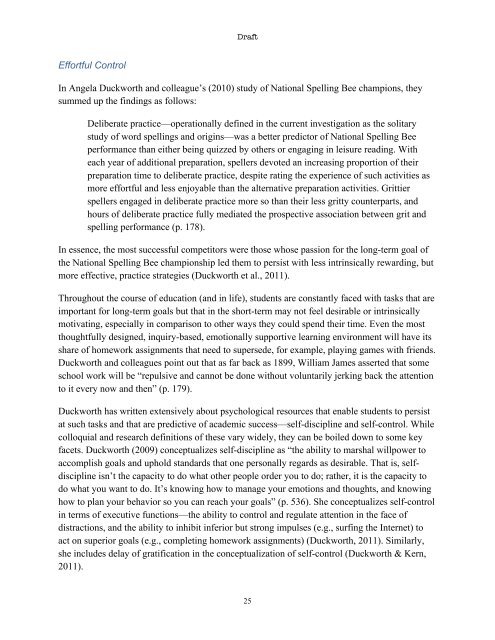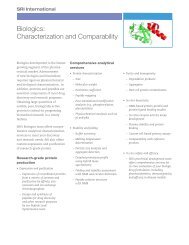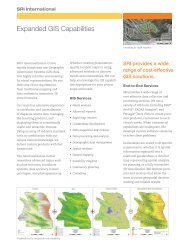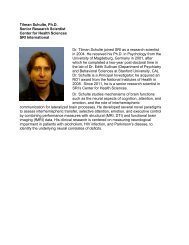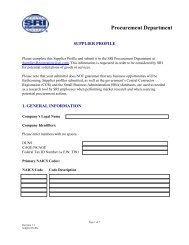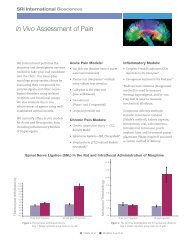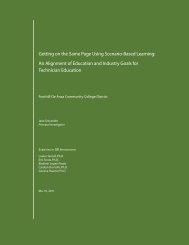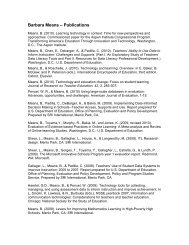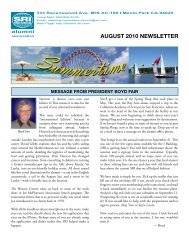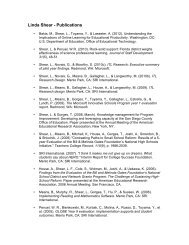Promoting Grit, Tenacity, and Perseverance - U.S. Department of ...
Promoting Grit, Tenacity, and Perseverance - U.S. Department of ...
Promoting Grit, Tenacity, and Perseverance - U.S. Department of ...
You also want an ePaper? Increase the reach of your titles
YUMPU automatically turns print PDFs into web optimized ePapers that Google loves.
Draft<br />
Effortful Control<br />
In Angela Duckworth <strong>and</strong> colleague’s (2010) study <strong>of</strong> National Spelling Bee champions, they<br />
summed up the findings as follows:<br />
Deliberate practice—operationally defined in the current investigation as the solitary<br />
study <strong>of</strong> word spellings <strong>and</strong> origins—was a better predictor <strong>of</strong> National Spelling Bee<br />
performance than either being quizzed by others or engaging in leisure reading. With<br />
each year <strong>of</strong> additional preparation, spellers devoted an increasing proportion <strong>of</strong> their<br />
preparation time to deliberate practice, despite rating the experience <strong>of</strong> such activities as<br />
more effortful <strong>and</strong> less enjoyable than the alternative preparation activities. <strong>Grit</strong>tier<br />
spellers engaged in deliberate practice more so than their less gritty counterparts, <strong>and</strong><br />
hours <strong>of</strong> deliberate practice fully mediated the prospective association between grit <strong>and</strong><br />
spelling performance (p. 178).<br />
In essence, the most successful competitors were those whose passion for the long-term goal <strong>of</strong><br />
the National Spelling Bee championship led them to persist with less intrinsically rewarding, but<br />
more effective, practice strategies (Duckworth et al., 2011).<br />
Throughout the course <strong>of</strong> education (<strong>and</strong> in life), students are constantly faced with tasks that are<br />
important for long-term goals but that in the short-term may not feel desirable or intrinsically<br />
motivating, especially in comparison to other ways they could spend their time. Even the most<br />
thoughtfully designed, inquiry-based, emotionally supportive learning environment will have its<br />
share <strong>of</strong> homework assignments that need to supersede, for example, playing games with friends.<br />
Duckworth <strong>and</strong> colleagues point out that as far back as 1899, William James asserted that some<br />
school work will be “repulsive <strong>and</strong> cannot be done without voluntarily jerking back the attention<br />
to it every now <strong>and</strong> then” (p. 179).<br />
Duckworth has written extensively about psychological resources that enable students to persist<br />
at such tasks <strong>and</strong> that are predictive <strong>of</strong> academic success—self-discipline <strong>and</strong> self-control. While<br />
colloquial <strong>and</strong> research definitions <strong>of</strong> these vary widely, they can be boiled down to some key<br />
facets. Duckworth (2009) conceptualizes self-discipline as “the ability to marshal willpower to<br />
accomplish goals <strong>and</strong> uphold st<strong>and</strong>ards that one personally regards as desirable. That is, selfdiscipline<br />
isn’t the capacity to do what other people order you to do; rather, it is the capacity to<br />
do what you want to do. It’s knowing how to manage your emotions <strong>and</strong> thoughts, <strong>and</strong> knowing<br />
how to plan your behavior so you can reach your goals” (p. 536). She conceptualizes self-control<br />
in terms <strong>of</strong> executive functions—the ability to control <strong>and</strong> regulate attention in the face <strong>of</strong><br />
distractions, <strong>and</strong> the ability to inhibit inferior but strong impulses (e.g., surfing the Internet) to<br />
act on superior goals (e.g., completing homework assignments) (Duckworth, 2011). Similarly,<br />
she includes delay <strong>of</strong> gratification in the conceptualization <strong>of</strong> self-control (Duckworth & Kern,<br />
2011).<br />
25


